Easy Homemade Fresh Lemon Juice Recipe
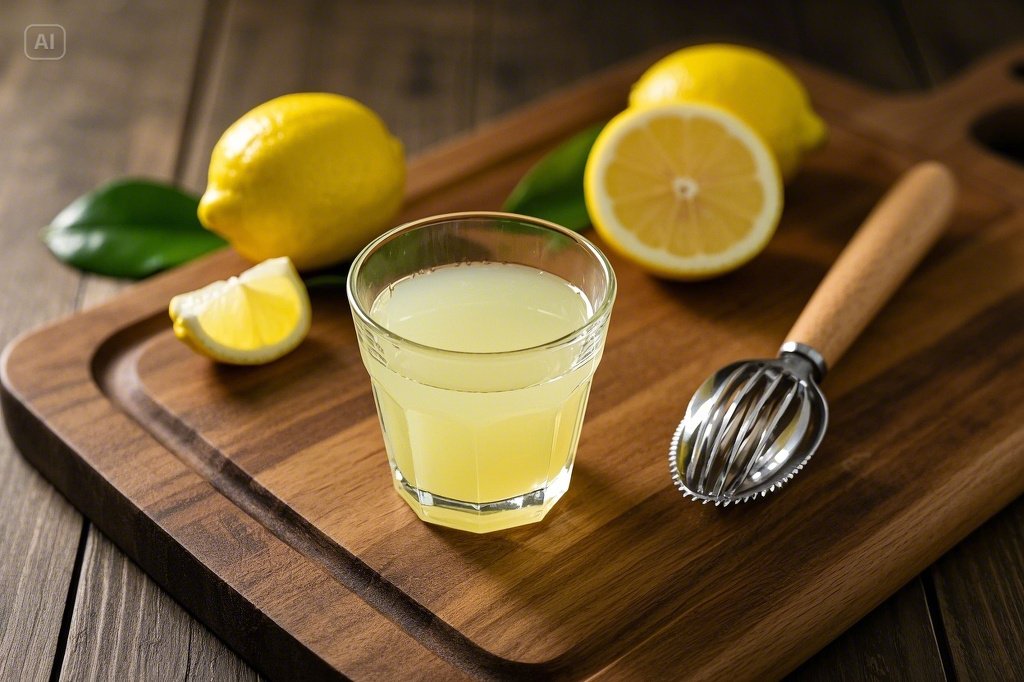
A Zest of Simplicity in Every Sip
You know that feeling when the sun warms your face, and all you want is something crisp, clean, and refreshing? There’s something nostalgic and uplifting about a glass of fresh lemon juice—it’s like sunshine in a cup. Whether you’re kickstarting your morning or cooling down after a long day, making your own fresh lemon juice is one of the simplest and most rewarding habits you can embrace.
No artificial ingredients. No preservatives. Just real lemons, pure juice, and a splash of effort. And the best part? It takes less than 10 minutes from start to finish. This isn’t just about making a drink—it’s about giving yourself a small daily ritual that tastes good and feels even better.
Here’s an expanded, expert-level version of your paragraph that dives deeper into the scientific, nutritional, and culinary reasons why fresh lemon juice is better than bottled — while maintaining a clear, reader-friendly tone:
Why Fresh Lemon Juice Is Better Than Bottled
When you squeeze your own lemons at home, you’re not just getting juice — you’re getting the purest form of flavor and nutrition that store-bought bottles simply can’t match. While bottled lemon juice may be convenient, it often sacrifices quality, freshness, and health benefits in the process.
Here’s why fresh is always the better choice:
Higher Nutrient Retention
Freshly squeezed lemon juice contains higher levels of vitamin C, a powerful antioxidant that supports immune function and skin health. It also preserves more flavonoids, which are plant-based compounds known for their anti-inflammatory and antioxidant properties. These delicate nutrients degrade quickly when exposed to heat and light — both of which are common during bottling and pasteurization.
No Preservatives or Additives
Most bottled lemon juices on the market are pasteurized to extend shelf life and are often treated with preservatives like sodium bisulfite or potassium metabisulfite. These can cause allergic reactions in sensitive individuals and may alter the juice’s natural taste. Some brands also add sugar or concentrate, which dilutes the juice’s acidity and reduces its overall nutritional value.
Cleaner, Brighter Flavor
Fresh lemon juice delivers a clean, crisp citrus flavor with natural acidity that enhances both sweet and savory dishes. In contrast, bottled juice can develop a slightly metallic or bitter aftertaste due to the processing and storage conditions. This makes a big difference in recipes where lemon is a key flavor component — such as salad dressings, sauces, marinades, or even your morning lemon water.
Better Culinary Results
Whether you’re whipping up hollandaise sauce for Eggs Benedict or adding a splash to grilled vegetables, fresh juice gives you better control over taste and acidity. It blends more smoothly into sauces and dressings, and its natural brightness helps balance the richness of butter, oils, and creamy textures — something bottled juice struggles to replicate.
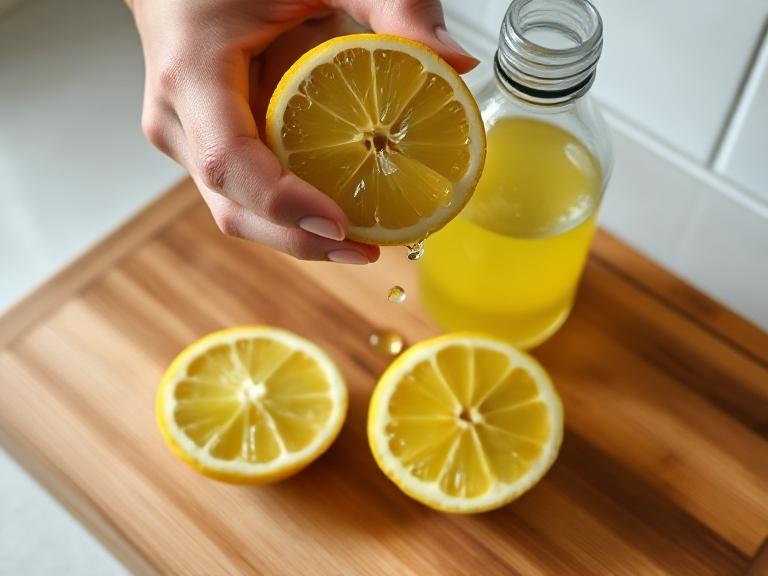
Choosing the Right Lemons for Juicing
Not all lemons are created equal. Your juice starts with quality citrus, and knowing what to pick makes all the difference.
What to Look For:
- Thin skin and heavy: The heavier the lemon, the juicier it usually is.
- Bright yellow, blemish-free skin: Avoid pale, soft, or shriveled fruit.
- Organic when possible: Especially if you’re planning to use the zest.
Top Varieties for Juicing:
- Eureka and Lisbon – easy to find, high juice content.
- Meyer lemons – slightly sweeter, perfect for lemonade or softer flavor profiles.
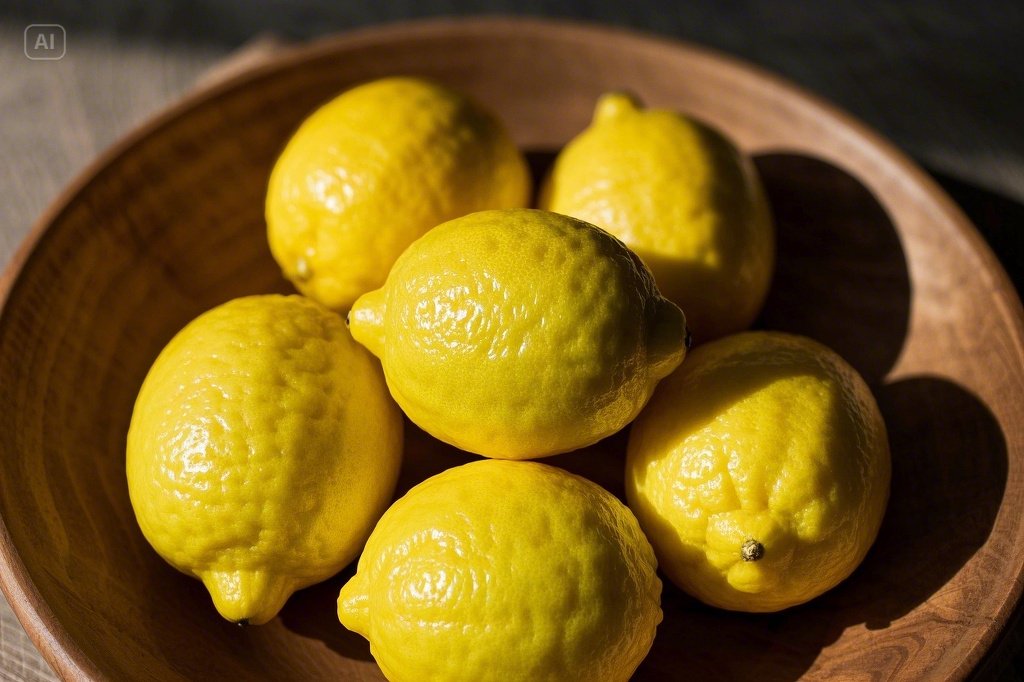
Tools You’ll Need to Make Fresh Lemon Juice
You don’t need a kitchen full of gadgets. Just a few simple tools will do the job:
- Manual citrus squeezer or handheld press: Great for small batches.
- Electric juicer: Ideal if you’re juicing several lemons at once.
- Fine mesh strainer: Removes pulp or seeds if you prefer smoother juice.
- Glass jar or pitcher: Best for storage and serving.
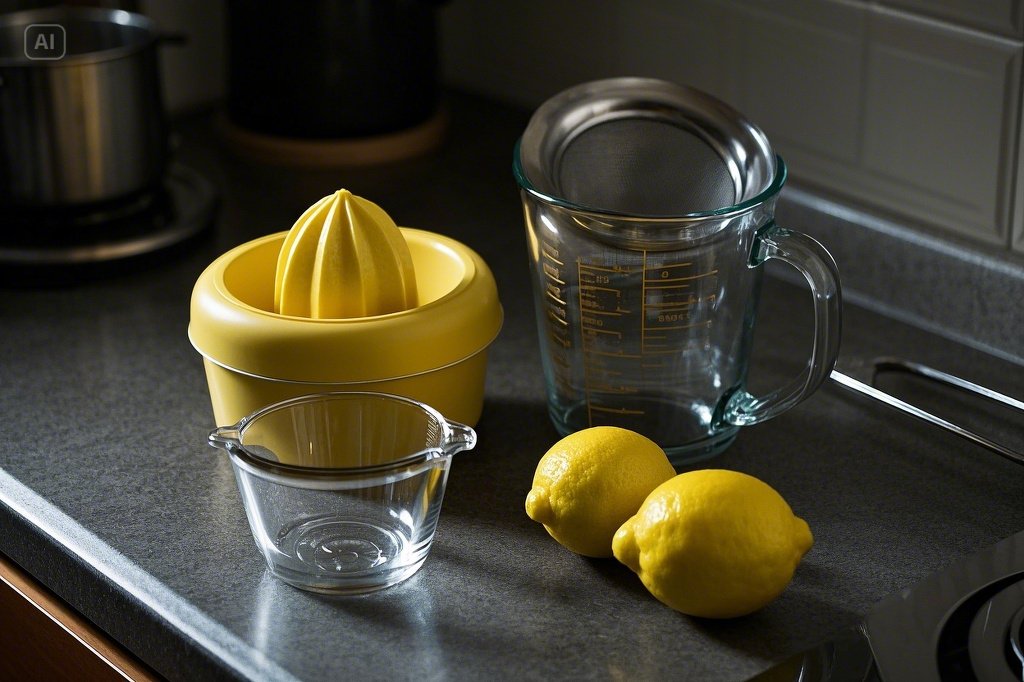
How to Make it Step by Step
Let’s get into the heart of it. Here’s exactly how to make fresh lemon juice, the simple way.
Ingredients
| Ingredient | Amount |
| Fresh lemons | 4–6 (yields ~1 cup) |
| Filtered water | Optional, to dilute |
| Honey or maple syrup | Optional, to sweeten |
Note: Always wash your lemons thoroughly before cutting and juicing.
Instructions
- Roll the lemons on a hard surface with your palm. This loosens the juices inside.
- Microwave each lemon for 10–15 seconds (optional, but helps extract more juice).
- Slice the lemons in half lengthwise for easier squeezing.
- Squeeze the juice using a manual juicer or by hand over a strainer.
- Strain the juice if you prefer it pulp-free.
- Serve immediately or store for later use.
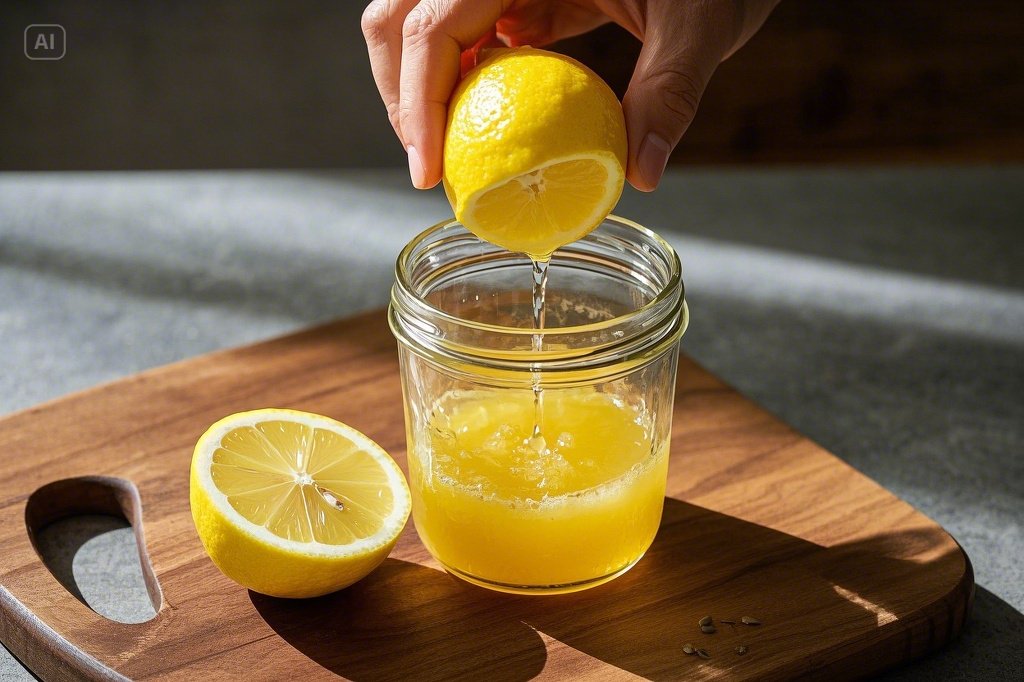
Flavor Variations for Lemon Juice
- Mint-infused: Add crushed mint leaves for a cooling, herbaceous twist.
- Cucumber blend: Mix lemon juice with cucumber water for a spa-style refresher.
- Ginger or turmeric boost: Adds anti-inflammatory benefits.
- Sweeteners: Natural options like honey, maple syrup, or stevia keep it clean.
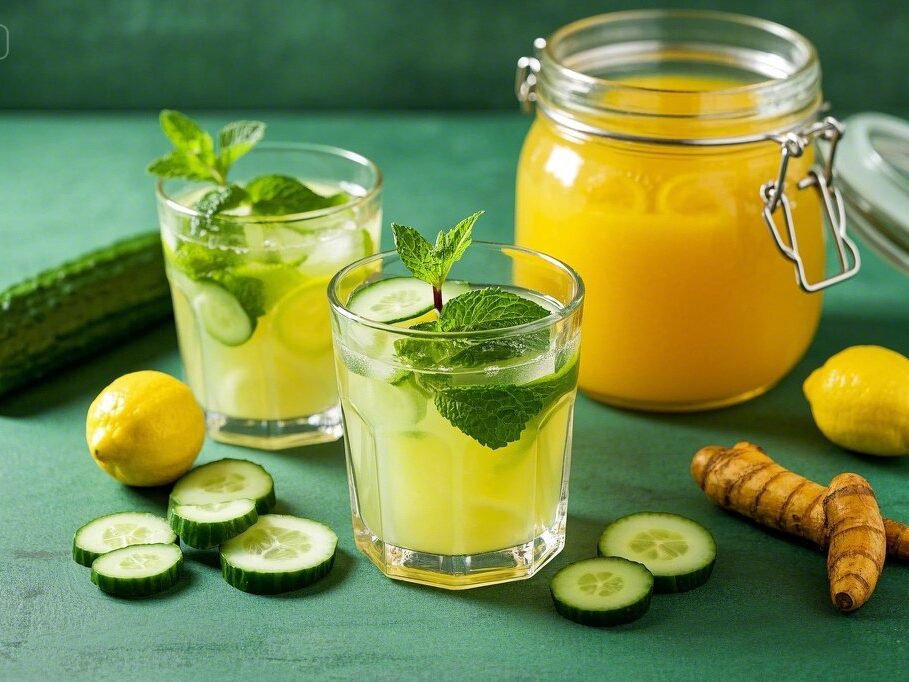
How to Store Fresh Lemon Juice Properly
You’ve made your juice—now keep it fresh.
Storage Tips:
- Use a glass bottle or jar main not plastic.
- Store in the fridge for up to 3–4 days.
- For longer storage, freeze in ice cube trays and transfer to a freezer-safe bag.
Health Benefits of Fresh Lemon Juice
Drinking fresh lemon juice regularly can support several aspects of your wellness.
Science-Backed Benefits:
- Rich in Vitamin C: Boosts your immune system and supports skin health.
- Aids digestion: Stimulates gastric juices.
- Hydration and detox : Helps flush toxins and alkalizes the body.
- May support weight management: Especially when consumed with warm water.
Uses of Fresh Lemon Juice
Fresh lemon juice is one of the most versatile ingredients in your kitchen. It adds a bright, zesty flavor to a wide range of recipes — from drinks and dressings to marinades and baked goods.
You can mix it into salad dressings for a fresh, citrusy kick, or use it to tenderize meats in marinades. It also cuts through the richness of creamy sauces, balances the sweetness in desserts, and even keeps fruits like apples and avocados from browning too quickly.
Fresh lemon juice is also an important ingredient in hollandaise sauce, especially when making classic recipes like Eggs Benedict. Its clean acidity helps balance the richness of butter and egg yolks, making the sauce smoother and more refined.
Whether you’re squeezing it over grilled vegetables, adding it to your tea, or using it to make homemade lemon curd, fresh lemon juice elevates both flavor and nutrition.
Sources: Healthline, Mayo Clinic, WebMD, NIH, Cleveland Clinic
Common Mistakes to Avoid When Making Lemon Juice
Even a simple recipe can go wrong if you don’t pay attention to the details.
Avoid These Pitfalls:
- Using cold lemons: You’ll get less juice.
- Skipping the microwave step: This helps loosen the inner membranes.
- Not straining if you dislike pulp
- Storing in plastic containers: Can leach chemicals and alter flavor.
- Using lemons that are past their prime
Frequently Asked Questions
Is fresh lemon juice healthier than bottled lemon juice?
Yes, fresh lemon juice is generally healthier than bottled lemon juice. When you squeeze a lemon yourself, you’re getting 100% pure juice without any added preservatives, flavor enhancers, or sulfites (which are commonly found in bottled versions). Fresh juice retains more of its natural vitamin C, enzymes, and antioxidants — all of which can degrade over time in processed, shelf-stable products.
Bottled lemon juice, while convenient, often undergoes pasteurization and contains additives that extend shelf life but reduce nutritional value. If you’re using lemon juice for health benefits, flavor, or culinary freshness — fresh is the better choice every time.
How long does fresh lemon juice last in the fridge?
Fresh lemon juice lasts about 3 to 4 days in the refrigerator when stored properly. To extend its freshness, pour the juice into an airtight container or a small glass jar with a tight-fitting lid. Exposure to air and light speeds up oxidation, which causes the juice to lose its flavor and nutritional potency.
If the juice starts to taste bitter, sour in an unpleasant way, or develops an odd smell, it’s best to discard it. Always label your container with the date it was squeezed so you can keep track of freshness easily.
Can you freeze fresh lemon juice?
Absolutely! Freezing fresh lemon juice is a great way to preserve its flavor and nutrients for long-term use. One of the easiest methods is to pour the juice into ice cube trays — each cube typically holds about 1 tablespoon of juice. Once frozen solid, transfer the cubes into a labeled freezer-safe bag.
Frozen lemon juice can be stored for up to 3 months. It’s perfect for cooking, baking, marinades, or even adding to a glass of water. Just pop out a cube when you need it — no waste, no mess.
Do I need a juicer to make fresh lemon juice?
No, you don’t need a fancy juicer to extract juice from a lemon. A simple fork, spoon, or even your clean hands will do the job just fine. Here’s how:
- With a fork or spoon: Cut the lemon in half and insert a fork into the flesh. Twist the fork while squeezing with your other hand — this helps break up the segments and release more juice.
- With your hands: Roll the lemon on the counter to soften it, then cut in half and squeeze tightly, using your fingers to press and turn.
For extra juice, try microwaving the lemon for 10–15 seconds first, or roll it firmly on a hard surface before cutting. These tricks help break down the internal membranes and make juicing easier.
How much juice comes from one lemon?
A medium lemon typically yields 2 to 3 tablespoons of juice, depending on its size, freshness, and ripeness. Larger lemons can give up to 4 tablespoons, while smaller ones may produce only 1 to 1.5 tablespoons.
To get the most juice out of your lemon:
- Use room-temperature lemons.
- Roll them on the countertop with gentle pressure.
- Microwave for a few seconds to soften (optional).
Pure Lemon Joy in Every Drop
You’ve now got everything you need to turn a humble lemon into your favorite everyday drink. Whether you’re mixing a cold glass for summer, boosting your wellness routine, or simply enjoying nature’s most vibrant citrus, knowing how to make fresh lemon juice puts real refreshment right at your fingertips.
Start your ritual. Feel the difference. Share the brightness.
Ready to make your own batch? Bookmark this guide, grab a few lemons, and enjoy the simplicity of real citrus flavor.
Share your lemon juice creations with us using #FreshZestDaily on social media!
